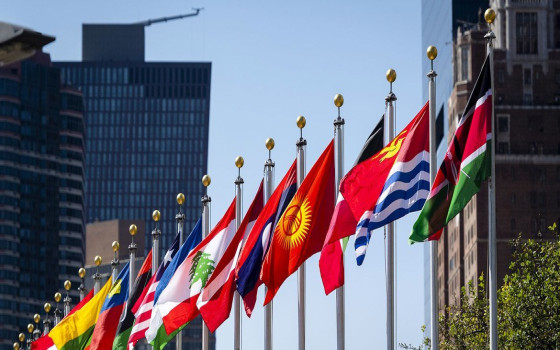
نيويورك : ترقب اعلانات جديدة بالاعتراف بدولة فلسطينية رغم معارضة الولايات المتحدة واسرائيل .. واشنطن وصفت الامر بانه عرقلة لجهود التوصل الى تسوية سلمية !!!

- Europe and Arabs
- الاثنين , 22 سبتمبر 2025 8:19 ص GMT
نيويورك : اوروبا والعرب
تستعد فرنسا والسعودية، اليوم الاثنين، لعقد قمة في نيويورك بمشاركة عشرات من قادة العالم لحشد الدعم لحل الدولتين، مع ترقب إعلانات جديدة بالاعتراف بدولة فلسطينية، في ظل معارضة قوية من الولايات المتحدة وإسرائيل.
اعترفت بريطانيا وكندا وأستراليا والبرتغال رسميًا بدولة فلسطينية يوم أمس الأحد، لتنضم بذلك إلى ما يقرب من 150 دولة اعترفت بالفعل، ومن المتوقع أن تحذو فرنسا حذوها في الجمعية العامة هذا الأسبوع.
وقال رئيس الوزراء الإسرائيلي بنيامين نتنياهو: "لن تقوم دولة فلسطينية، والرد النهائي لفرض علينا دولة إرهاب في قلب بلادنا سيُعطى بعد عودتي من الولايات المتحدة"، جاءت أقواله بعد إعلان بريطانيا وكندا وأستراليا الاعتراف بالدولة الفلسطينية. بحسب مانقل موقع شبكة الاخبار الاوروبية في بروكسل ر" يورونيوز" واضاف تحت عنوان :معارضة أمريكية إسرائيلية" يقول "
لكن الجهود المبذولة لدفع حل الدولتين تواجه عقباتٍ كبيرة، بدءًا من المعارضة الشديدة من الولايات المتحدة وإسرائيل.
فقد منعت الولايات المتحدة المسؤولين الفلسطينيين من حضور الجمعية العامة، كما هدد رئيس الوزراء الإسرائيلي بنيامين نتنياهو، المعارض لقيام دولة فلسطينية، باتخاذ إجراءات أحادية الجانب ردًا على ذلك، قد تشمل ضم أجزاء من الضفة الغربية.
في يوليوالماضي، انتقد الرئيس الأمريكي دونالد ترامب بشدّة إعلان الرئيس الفرنسي إيمانويل ماكرون نيته الاعتراف بالدولة الفلسطينية ووصفه بأن "لا قيمة له".
كما اعتبر وزير الخارجية الأمريكي ماركو روبيو أنّ نوايا عدد من الدول الاعتراف بدولة فلسطين "تعقّد جهود التوصل إلى تسوية سلمية"، معتبرًا أنّ هذه الخطوات "في الغالب إيماءات رمزية مرتبطة بالسياسات الداخلية لهذه الدول".
دعم أمريكي لضمّ الضفة
وذكرت قناة "آي 24 نيوز" العبرية نقلاً عن مصدر سياسية قوله إن روبيو أعطى الضوء الأخضر لفرض السيادة في الضفة الغربية.
ولفتت القناة إلى أن نتنياهو متردد في كيفية التصرف، ومن المتوقع أن يتخذ القرار بعد خطابه في الجمعية العامة للأمم المتحدة في نيويورك، وبعد لقائه مع الرئيس الأمريكي دونالد ترامب، مضيفة أن الخيارات المتاحة هي الاعتراف الكامل أو الاعتراف الجزئي.
وتحت عنوان "لا سلام دون حل الدولتين" اضاف المصدر نفسه "قال الأمين العام للأمم المتحدة أنطونيو غوتيريش الأسبوع الماضي: "يجب على إسرائيل أن تفهم أن حل الدولة الواحدة، مع إخضاع الشعب الفلسطيني دون حقوق، أمر لا يُطاق على الإطلاق". بدون حل الدولتين، لن يكون هناك سلام في الشرق الأوسط.
بحسب وكالة "أسوشييتد برس"، كانت حكومة نتنياهو ومعظم الطبقة السياسية الإسرائيلية معارضة لقيام دولة فلسطينية حتى قبل الحرب. ولم تُبدِ إدارة ترامب أي اهتمام بإحياء محادثات السلام، بل دعت بدلاً من ذلك إلى نقل جزء كبير من سكان غزة إلى دول أخرى، وهي خطة تبنتها إسرائيل بحماس حتى مع وصف النقاد لها بأنها بمثابة تطهير عرقي.
الخطة الفرنسية السعودية
طرحت فرنسا والمملكة العربية السعودية خطة مرحلية لإنهاء الصراع من خلال إقامة دولة منزوعة السلاح تحكمها السلطة الفلسطينية بمساعدة دولية.
تدعو الخطة إلى إنهاء فوري للحرب في غزة، وإعادة جميع الأسرى، وانسحاب إسرائيلي كامل. وستسلم حماس السلطة إلى لجنة مستقلة سياسياً تحت رعاية السلطة الفلسطينية - وهو أمر وافقت عليه بالفعل - وتتخلى عن سلاحها، وهو ما لم تفعله.
سيساعد المجتمع الدولي السلطة الفلسطينية على إعادة بناء غزة وحكم الأراضي الفلسطينية، ربما بمساعدة قوات حفظ سلام أجنبية. سيتبع ذلك سلام وتكامل إقليمي، بما في ذلك على الأرجح تطبيع العلاقات السعودية مع إسرائيل.
وافقت الهيئة العالمية، المؤلفة من 193 عضوًا، على قرار غير ملزم يؤيد ما يسمى "إعلان نيويورك" في وقت سابق من هذا الشهر.
عقبات أخرى
بحسب "أسوشييتد برس"، تتجاهل الخطة الفرنسية السعودية أكثر القضايا إثارة للانقسام في الصراع: الحدود النهائية، ومصير المستوطنات، وعودة اللاجئين الفلسطينيين من الحروب السابقة، والترتيبات الأمنية، ووضع القدس، والاعتراف بإسرائيل كدولة يهودية.
كما أنها تعتمد بشكل كبير على السلطة الفلسطينية، التي لا تنال قيادتها الحالية تأييد العديد من الفلسطينيين الذين يعتبرونها فاسدة ومستبدة.
وتقول إسرائيل إنها غير ملتزمة تمامًا بالسلام وتتهم السلطة الفلسطينية بالتحريض على الرغم من الإصلاحات الأخيرة.
تدعو الخطة، بحسب الوكالة، إلى إجراء انتخابات فلسطينية خلال عام، لكن الرئيس محمود عباس أجّل الانتخابات السابقة عندما بدا أن حزبه سيخسر، مُلقيًا باللوم على القيود الإسرائيلية. وستُستبعد حماس، التي فازت في الانتخابات الوطنية الأخيرة عام 2006، ما لم تُسلّم سلاحها وتعترف بإسرائيل.












لا يوجد تعليقات